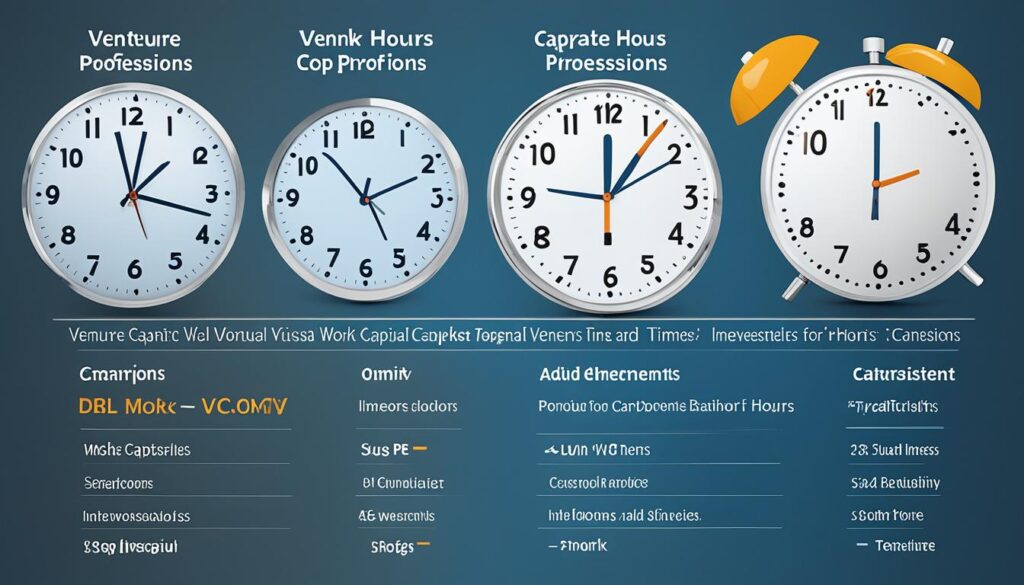Venture capitalists are known for their tireless work ethic, but have you ever wondered just how many hours they clock in each week? Delving into the world of venture capital, we’ll explore the demanding lifestyle that defines this high-stakes industry. Are you ready to uncover the true extent of the hours required to succeed as a VC?
Key Takeaways
- Venture capitalists typically work 60-80 hours per week, significantly more than the standard 40-hour workweek.
- The venture capital lifestyle is demanding, with junior-level roles focusing on sourcing, deal execution, and portfolio company support.
- Senior-level VC roles involve more networking, branding, and managing Limited Partner (LP) relations.
- Work hours can vary across early-stage and late-stage VC firms, as well as between junior and senior-level positions.
- Understanding the realities of the VC lifestyle is crucial for those considering a career in the industry.
Understanding the Venture Capital Lifestyle
The venture capital industry is renowned for its demanding work culture, where venture capital lifestyle and VC work culture are defined by long hours and a relentless pursuit of promising startups. Venture capitalists must dedicate significant time and effort to sourcing new investment opportunities, meticulously evaluating deals, and providing ongoing support to their portfolio companies.
Long Hours and Demanding Work
The reality of the venture capital profession is that it often requires 60-80 hours of work per week, far exceeding the traditional 40-hour workweek. This intense schedule is driven by the need to stay ahead of the competition, thoroughly vet potential investments, and ensure the success of the companies in which they have invested. The demanding nature of the job can be both exhilarating and exhausting, as venture capitalists navigate the high-stakes world of entrepreneurship.
A Passion for Startups and Entrepreneurship
Despite the long hours and rigorous work demands, venture capitalists are often driven by a deep passion for startups and entrepreneurship. They thrive on the excitement of identifying and nurturing the next generation of innovative companies, fueled by the prospect of uncovering the next big disruptive idea. This passion for the industry is a crucial component of the VC lifestyle, as it motivates them to work tirelessly to uncover and support the most promising ventures.

Typical Work Week in Venture Capital
The typical work week for venture capitalists can vary significantly depending on the stage of the firms they work for and their seniority within the organization. Understanding these nuances is crucial for aspiring professionals looking to navigate the typical VC work week.
Early-Stage VCs and Late-Stage VCs
Early-stage venture capital firms tend to have a greater focus on sourcing new deals and executing investments, which can lead to longer work hours for their investment teams. These firms are typically on the hunt for the next big idea, requiring extensive research, networking, and deal-making efforts. In contrast, late-stage VC firms may have a more balanced workload, with more time spent on supporting and nurturing their existing portfolio companies.
Junior Roles vs. Senior Roles
The division of responsibilities within a venture capital firm also plays a significant role in shaping the junior vs senior VC roles and their respective work weeks. Junior-level positions, such as Analysts and Associates, typically devote more time to sourcing new investment opportunities and executing deals. They may work longer hours as they build their experience and demonstrate their value to the firm. Senior-level roles, like Partners, often shift their focus towards portfolio company support, networking, and fundraising, which may lead to a more balanced work schedule compared to their junior counterparts.
| Venture Capital Firm Stage | Typical Work Week |
|---|---|
| Early-Stage VC | Longer hours, focused on sourcing and deal execution |
| Late-Stage VC | More balanced workload, with more time spent on portfolio company support |
| Junior VC Roles | Longer hours, concentrated on sourcing and deal execution |
| Senior VC Roles | More balanced workload, with focus on portfolio company support, networking, and fundraising |
By understanding the variations in early-stage vs late-stage VC work and the differences between junior vs senior VC roles, aspiring venture capitalists can better prepare themselves for the demands of the industry and make informed decisions about the type of firm and position that aligns with their career goals and work-life preferences.

How long are VC hours?
Venture capitalists typically work 60-80 hours per week, significantly more than the standard 40-hour workweek. The venture capital work hours can be quite varied, with long hours during deal execution and portfolio company support, balanced by more flexible periods.
60-80 Hours per Week
Venture capitalists may work late nights and weekends, especially when evaluating potential investments or helping portfolio companies with critical issues. The demanding nature of the job, combined with the high-stakes decision-making, contributes to the VC hours per week required in the venture capital industry.
Varied Work Schedule
The work schedule of venture capitalists can fluctuate, with periods of intense activity followed by more manageable periods. This variability is a reflection of the multifaceted responsibilities that VCs must juggle, from sourcing and executing deals to providing ongoing support to their portfolio companies.

Reasons for Long VC Hours
Venture capitalists work long hours due to the nature of their multifaceted responsibilities. Sourcing and evaluating new investment opportunities, conducting thorough due diligence, and executing deals require significant time and effort. Once investments are made, venture capitalists must also provide ongoing support to their portfolio companies, helping with strategic decisions, fundraising, hiring, and other critical issues.
Sourcing and Deal Execution
The process of sourcing and executing deals is a time-intensive endeavor for venture capitalists. They must constantly search for promising startups, review business plans, and engage in extensive negotiations to secure investments. This work often necessitates long hours, late nights, and weekends to ensure that potential deals are properly evaluated and finalized.
Portfolio Company Support
Venture capitalists do not simply invest in companies and walk away. They take an active role in supporting their portfolio companies, providing guidance, expertise, and hands-on assistance. This involves regular meetings, strategic planning sessions, and troubleshooting to help the companies navigate various challenges and achieve their goals. The need to be available and responsive to their portfolio companies contributes significantly to the long work hours expected of venture capitalists.
Networking and Branding
In addition to their deal-making and portfolio management responsibilities, venture capitalists also devote time to networking and building their firm’s brand. Attending industry events, conferences, and networking functions, as well as creating online content, all contribute to the long hours that venture capitalists work. This networking and branding effort is crucial for maintaining a strong reputation, sourcing new deals, and attracting top talent to their firms.
The combination of these key responsibilities – sourcing and executing deals, providing ongoing support to portfolio companies, and engaging in networking and branding activities – results in the demanding schedule that is typical of the venture capital industry.

Work-Life Balance in Venture Capital
Maintaining a healthy work-life balance can be challenging in the venture capital industry due to the long hours and demanding nature of the work. Venture capitalists must constantly be available to support their portfolio companies, which can make it difficult to disconnect and devote time to personal and family commitments. Achieving a good work-life integration requires intentional effort, such as setting clear boundaries, prioritizing self-care, and delegating tasks when possible.
Fortunately, some venture capital firms are recognizing the importance of work-life balance and implementing policies to support their employees in this area. By providing resources and encouraging a healthier work culture, these firms aim to help venture capitalists find a sustainable balance between their professional and personal lives.
| Strategies for Improving Work-Life Balance in Venture Capital | Benefits |
|---|---|
| Set clear boundaries (e.g., no work on weekends, dedicated family time) | Helps prevent burnout and promotes better mental health |
| Prioritize self-care activities (e.g., exercise, meditation, hobbies) | Enhances overall well-being and improves productivity |
| Delegate tasks and responsibilities to team members | Frees up time for more strategic and high-impact work |
| Utilize technology to streamline workflows and communication | Increases efficiency and reduces time spent on administrative tasks |
By embracing these strategies and with the support of progressive venture capital firms, venture capitalists can strive to maintain a healthier work-life balance and ultimately deliver more sustainable value to their portfolio companies and the broader startup ecosystem.

Differences Across Venture Capital Firms
As the venture capital industry continues to evolve, it’s important to understand that the work hours and culture can vary significantly across different VC firms. These differences are largely driven by the stage of the firms, as well as their unique organizational values and leadership.
Early-Stage vs. Late-Stage Firms
Early-stage VC firms, focused on sourcing and executing deals with promising startups, tend to have a more intense work schedule. These firms often require their investment professionals to dedicate long hours to identifying, evaluating, and closing new investments. The fundraising process can be especially time-consuming, with the average startup taking around 5 months to complete a funding round.
In contrast, late-stage VC firms may have a more balanced workload, with more time spent on supporting and monitoring their portfolio companies. These firms often have a greater focus on strategic decision-making, portfolio management, and leveraging their networks to help their investments succeed.
Firm Culture and Work Ethic
Firm culture and work ethic can also play a significant role in shaping the hours and environment within a VC firm. Some firms are known for their demanding, fast-paced culture, where long hours and high-intensity work are the norm. These early-stage VC firms may prioritize aggressive growth and deal-making over work-life balance.
On the other hand, there are VC firms that place a greater emphasis on maintaining a healthy work culture, with a focus on work-life integration and employee well-being. These late-stage firms may have more reasonable work hours and a greater appreciation for the long-term sustainability of their investment professionals.
The size and stage of the VC firm, as well as its leadership and values, can all contribute to the differences in work hours and culture across the industry. Understanding these nuances is crucial for those considering a career in venture capital, as it can help them identify the firms that best align with their personal and professional goals.

| Characteristic | Early-Stage VC Firms | Late-Stage VC Firms |
|---|---|---|
| Work Hours | Longer work weeks, with a focus on deal sourcing and execution | More balanced workload, with more time spent on portfolio company support |
| Firm Culture | Demanding, fast-paced environment prioritizing aggressive growth | Greater emphasis on work-life integration and employee well-being |
| Key Responsibilities | Identifying and evaluating new investment opportunities, closing deals | Strategic decision-making, portfolio management, leveraging networks |
Strategies for Managing VC Hours
As venture capitalists navigate the demanding work culture of the industry, it’s crucial to employ effective strategies to manage their long hours and maintain a healthy work-life balance. Three key approaches can help VCs find greater efficiency and fulfillment in their roles:
Time Management Skills
Developing strong time management skills is essential for venture capitalists who seek to optimize their productivity and potentially reduce their overall work hours. Techniques such as prioritizing tasks, delegating responsibilities, and streamlining workflows can help VCs work more efficiently, freeing up time for other pursuits. By leveraging time management best practices, VCs can better manage the constant demands on their schedules and focus on the most critical aspects of their roles.
Setting Boundaries
Establishing clear boundaries is another critical strategy for venture capitalists aiming to maintain a work-life balance. This may involve limiting work on weekends, setting aside dedicated family time, or defining specific hours during which they are accessible to portfolio companies and other stakeholders. By setting these boundaries and communicating them effectively, VCs can better protect their personal time and prevent burnout.
Leveraging Technology
Advancements in technology can also play a significant role in helping venture capitalists manage their workloads and optimize their time. By utilizing project management tools, communication platforms, and other digital solutions, VCs can streamline their workflows, improve collaboration, and potentially reduce the time spent on administrative tasks. Leveraging technology can enable VCs to work more efficiently, ultimately freeing up time for their personal lives.
By incorporating these strategies for managing VC hours, including effective time management, setting clear boundaries, and leveraging technology, venture capitalists can find ways to navigate the long work hours and demanding nature of their industry while maintaining a healthier work-life balance.

Comparison with Other Finance Careers
When considering the work hours in venture capital, it’s important to understand how they compare to other finance careers. Investment banking is widely known for its demanding schedules, with analysts and associates commonly working 80-100 hours per week. In contrast, the typical work week for private equity professionals tends to be slightly better, ranging around 60-80 hours.
Investment Banking Hours
Investment banking is infamous for its grueling work hours, with junior-level staff often clocking in 80-100 hours per week. The high-pressure, deal-driven nature of investment banking requires long hours to execute complex transactions and meet tight deadlines. This intense work culture can be challenging to sustain over the long term.
Private Equity Hours
While private equity also demands significant time commitments, the work hours tend to be slightly better than investment banking. Private equity professionals typically work 60-80 hours per week, which, while still lengthy, is generally more manageable compared to the investment banking lifestyle. The nature of private equity work, which involves more strategic planning and portfolio company management, may contribute to a slightly more balanced schedule.
In comparison, the venture capital work hours of 60-80 hours per week, while still demanding, are generally considered better than the investment banking grind. The venture capital industry’s focus on strategic decision-making and ongoing support for portfolio companies may provide more sustainable work-life integration over the long run.

Potential Burnout and Consequences
The long work hours and demanding nature of the venture capital industry can potentially lead to burnout among professionals. Signs of burnout may include chronic exhaustion, lack of motivation, decreased productivity, and emotional detachment from work. The impact of burnout can be significant, both professionally and personally.
Signs of Burnout
Venture capitalists working long hours and juggling numerous responsibilities may experience symptoms of burnout in VC, such as persistent fatigue, diminished job satisfaction, and a sense of being overwhelmed. These signs can negatively impact their ability to make sound investment decisions, provide effective support to portfolio companies, and maintain strong industry relationships.
Impact on Personal Life
The consequences of long VC hours can also take a toll on venture capitalists’ personal lives. Burnout can lead to strained relationships, neglect of self-care, and an overall decrease in well-being. The impact of the VC lifestyle on mental and physical health is a growing concern, and addressing burnout is crucial for long-term success and sustainability in the venture capital field.

Conclusion
In conclusion, venture capitalists typically work long hours, often 60-80 hours per week, to fulfill the demanding responsibilities of their role. The venture capital lifestyle requires a passion for startups and entrepreneurship, as well as a willingness to devote significant time and effort to sourcing deals, executing investments, and supporting portfolio companies. While the hours can vary across different VC firms and seniority levels, the overall work culture in the industry is known for its intensity.
Maintaining a healthy work-life balance can be challenging, but venture capitalists can employ strategies such as effective time management, setting boundaries, and leveraging technology to manage their workload. Understanding the realities of the VC lifestyle is important for those considering a career in the industry, as the long hours and high-stakes decision-making can potentially lead to burnout if not addressed properly.
In summary, the conclusion on VC hours and the overall summary of VC work hours highlight the demanding nature of the venture capital industry, where professionals often work 60-80 hours per week to navigate the complex responsibilities of their role. Acknowledging and addressing the potential for burnout is crucial for those seeking a fulfilling and sustainable career in the world of venture capital.
